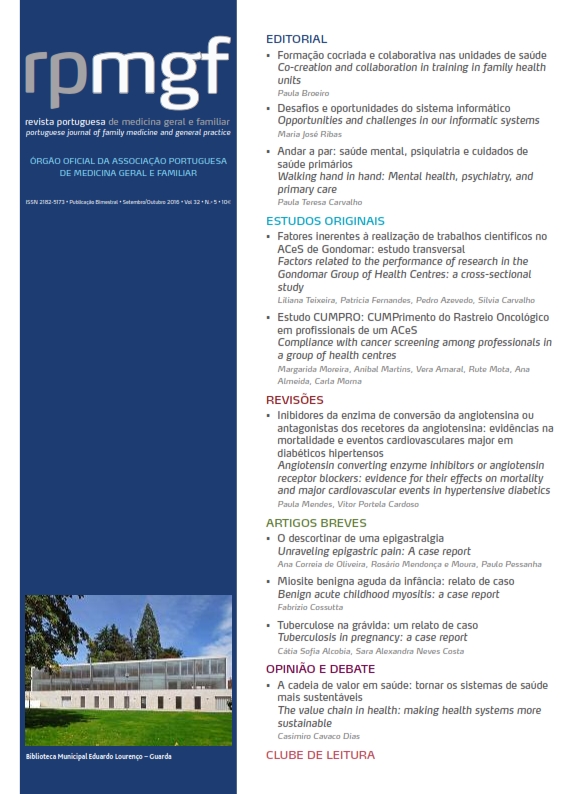Tuberculosis in pregnancy: a case report
DOI:
https://doi.org/10.32385/rpmgf.v32i5.11890Keywords:
Pregnancy, Tuberculosis, Family physicianAbstract
Introduction: Tuberculosis is an infectious disease with a declining prevalence in Portugal, with more cases reported in urban centres. Most cases are diagnosed by passive screening but there are reports of increasing delay between the onset of the symptoms and diagnosis. Although this disease is rare in pregnant women, early diagnosis is important, because of the risk of vertical transmission to the fetus. Case Description: We present the case of a 32 year-old woman who began follow-up of her pregnancy with her family doctor at eight weeks gestation. Her partner was diagnosed with pulmonary tuberculosis during the 26th week of gestation. She was referred for contact screening which was negative. Two weeks later she presented with fever and thoracic pain with a tubercular pleural effusion. She started tuberculostatic therapy. Delivery was at 39 weeks without complications. The infant received immediate chemoprophylaxis that was stopped after confirming the absence of disease. The mother was followed by a pneumologist with good clinical and laboratory resolution, and was discharged from care without active disease. Comments: This case report demonstrates the importance of early diagnosis of tuberculosis in pregnancy. The first contact with the patient may occur in primary care.Downloads
Downloads
Published
Issue
Section
License
The authors will assign to the RPMGF the sole right to publish and distribute the content of the manuscript specified in this declaration via physical, electronic, broadcasting or any other medium that may come into existence. They also grant the RPMGF the right to use and exploit this manuscript, in particular by assigning, selling or licensing its content. This permission is permanent and takes effect from the moment the manuscript is submitted, has the maximum duration allowed by applicable Portuguese or international law and is of worldwide scope. The authors further declare that this assignment is made free of charge. If the RPMGF informs the authors that it is not going to publish their manuscript, the exclusive assignment of rights ceases forthwith.
The authors authorise the RPMGF (or any entity it may appoint) to act on their behalf when it believes that copyright may have been infringed.





